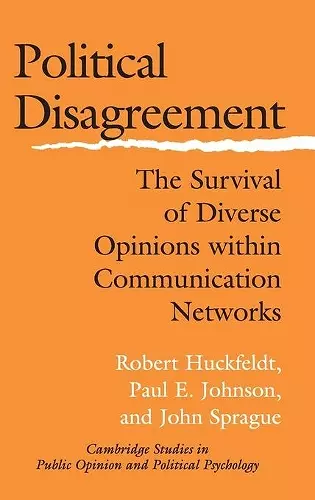Political Disagreement
The Survival of Diverse Opinions within Communication Networks
John Sprague author Paul E Johnson author Robert Huckfeldt author
Format:Hardback
Publisher:Cambridge University Press
Published:12th Jul '04
Currently unavailable, and unfortunately no date known when it will be back
This hardback is available in another edition too:
- Paperback£29.99(9780521542234)

This book demonstrates the ubiquitous nature of political disagreement occurring among ordinary citizens.
Political disagreement is frequently widespread within the everyday patterns of political discussion that occur among ordinary citizens. The authors demonstrate the ubiquitous nature of political disagreement, even within the networks and contexts that comprise the micro-environments of democratic citizens.Political disagreement is widespread within the communication network of ordinary citizens; furthermore, political diversity within these networks is entirely consistent with a theory of democratic politics built on the importance of individual interdependence. The persistence of political diversity and disagreement does not imply that political interdependence is absent among citizens or that political influence is lacking. The book's analysis makes a number of contributions. The authors demonstrate the ubiquitous nature of political disagreement. They show that communication and influence within dyads is autoregressive - that the consequences of dyadic interactions depend on the distribution of opinions within larger networks of communication. They argue that the autoregressive nature of political influence serves to sustain disagreement within patterns of social interaction, as it restores the broader political relevance of social communication and influence. They eliminate the deterministic implications that have typically been connected to theories of democratic politics based on interdependent citizens.
'Political Disagreement discovers, in the contingencies of personal acquaintanceship, a foundation for democratic dissent. It is a work of the first order of originality, intellectual power, and importance.' Paul M. Sniderman, Stanford University
'A wonderful example of what social science can be … a well-articulated theory of how and why one's informal, face-to-face social networks are more diverse than social conformity and dissonance studies suggest. It then goes on to explain how this diversity helps citizens form and maintain their political beliefs and attitudes, and yes, even be persuaded. In a series of strong empirical tests, Huckfeldt demonstrates that from this diversity of opinion, citizens become capable of thinking more deeply about issues and - this a key point - develop tolerance for different points of view. Rarely do we see a better blend of theory informed empirical tests of important substantive and normative questions central to the conditions underlying a democratic citizenry.' Milton Lodge, Stony Brook University
ISBN: 9780521834308
Dimensions: 238mm x 157mm x 23mm
Weight: 482g
272 pages